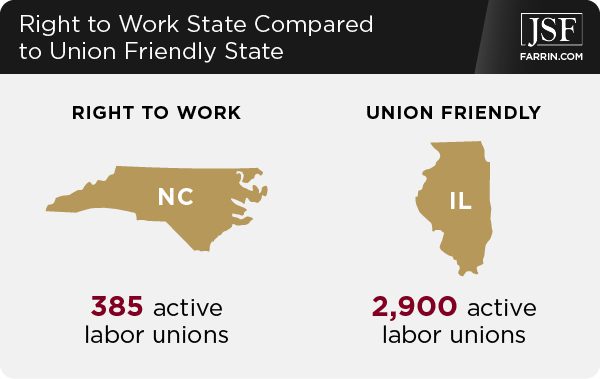A lot of people think that “right to work laws” and “employment-at-will” are the same thing. The truth is that they are completely separate, and the differences between them have a profound effect on workers. They also impact how employees can pursue a case for compensation against their employers.
Functionally, one of these North Carolina employment laws has almost nothing to do with most cases, and the other may have everything to do with them. Here’s what you should know.
Is North Carolina a Right to Work State?
Yes. What most people don’t know is that “right to work” is all about labor unions and how non-union workers are treated. North Carolina’s right to work law (NC G.S 95-78) greatly limits the power of labor unions in the state by making certain arrangements illegal.
The statute says: “The right to live includes the right to work. The right to work shall not be denied or abridged on account of membership or non-membership in any labor union or organization.”
There are several ways that labor unions can affect employment for individuals in states without right to work laws. These examples are all illegal in North Carolina.
The “Union Shop” Arrangement
The first union-related arrangement that North Carolina’s laws ban is the so-called “union shop.” Under this arrangement, an employee hired to work at a company whose labor force is unionized must join that union and pay union dues. In return, the employee gains the union’s collectively bargained rights and benefits.
The “Agency Shop” Arrangement
Under the “agency shop” arrangement, a worker hired by a company with a unionized workforce is not required to join that union. However, that employee is required to pay an amount equal to the union dues. In return, the employee again gains the union’s collectively-bargained rights and benefits.
The “Fair Share” Arrangement
The “fair share” arrangement does not require a worker to join a union or pay full union dues in order to work at an employer with a unionized workforce. The new worker is only required to pay a portion of the union dues that, theoretically, fairly compensates the union for its efforts in collective bargaining for benefits for the workforce. The new employee gets those benefits.
What Effect Does NC Right to Work Law Have on Union Labor?
Logically, the right to work law in North Carolina severely limits labor unions. That’s not to say they do not exist. There are 385 labor unions active in the state of North Carolina. However, compare that number to a state without right to work laws, like Illinois, where there are more than 2,900 unions and you can see the effect of the law.
All things considered, however, it is difficult to imagine a situation where a worker might file a lawsuit based on North Carolina’s right to work laws. The laws governing the activities that might trigger a lawsuit are the state’s employment at will laws.
What Does At-Will Employment Mean in North Carolina?
Under at-will employment in North Carolina (also known as employment at will), employment is an agreement between the employer and the worker, and can be created or terminated at the will of either party. In other words, an employer can terminate a worker for no reason and a worker can quit for no reason at any time.
Generally speaking, the employment at will arrangement is friendlier to employers, and allows them greater flexibility to make sudden reductions in their workforces to save on costs. However, there are exceptions to the employment at will law that you should be aware of.
Employment Contracts Generally Replace Employment at Will in North Carolina
If you have an employment contract, the rules for why you can be terminated and the process required to resign will likely be detailed in the contract. Because you and your employer agreed to a contract, you’re no longer employed at will. Consult your contract for the terms of your employment, or an attorney if you’re having a problem.
Can an Employer in North Carolina Fire Me for Any Reason?
Employers can generally terminate employees at will, but exceptions do exist. There are cases in which North Carolina’s employment at will laws do not apply, and for a variety of different reasons. These include (but are not necessarily limited to):
-
- Discrimination – Employers cannot discriminate against protected classes as outlined by Title VII of the Civil Rights Act, including race, color, religion, national origin, and sex (including pregnancy, gender identification, and sexual orientation). North Carolina law adds HIV/AIDS diagnosis/status, military service, sickle cell anemia or hemoglobin C diagnosis/status, and users of a lawful substances as protected classes as well.
-
- Retaliation – Under the Retaliation in Employment Discrimination Act, an employer may not fire you because you were injured at work and made a worker’s compensation claim. Also, if you took time off to file a domestic violence restraining order, made a safety complaint to OSHA, NCDOL, or because your employer is violating mine safety, pesticide law, or proper storage of drug paraphernalia, your employer can not retaliate by firing you.
If you were wrongfully terminated or discriminated against, you should consult with an employment law attorney to figure out if you have a case and what compensation you may be able to seek.
The State Personnel Act, “Just Cause,” and Other Exceptions to Employment at Will
State employees, generally speaking, are not “employed at will” in North Carolina. Their employment terms are governed by the State Personnel Act. Without delving too deeply into the details, once most state employees have passed a probationary period at the beginning of their employment, they can only be terminated for “just cause,” which is specified in the statute.
State entities and municipalities may also pass ordinances that change the status of their employees away from employment at will.
If You Believe You Were Wrongfully Fired, Contact an Attorney
No matter where you are employed, there’s always the possibility that you may be mistreated or terminated from your job unfairly. You should not let an employer unfairly take away your ability to make a living, and that can happen (and sadly does happen).
This blog is not an exhaustive guide, but should serve to give you a good idea of the difference between “right to work” and “employment at will” in North Carolina. I encourage you to contact an attorney if you believe your rights have been violated. Sometimes, it can be hard for the average person to even know when they’ve been unfairly treated.
As an employment law attorney, I can say with confidence that it happens often. Fight back if it happens to you. You can always call us at 1-866-900-7078 for a free case evaluation. You shouldn’t stop looking for a better job – there’s almost always one out there – but don’t let someone violate your employment rights either!






